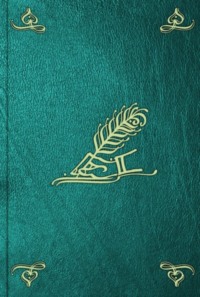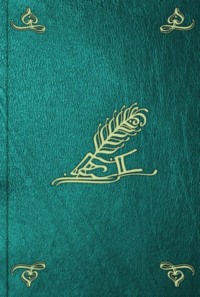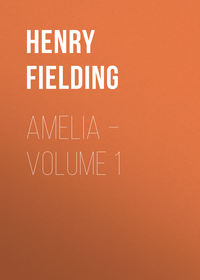 полная версия
полная версияThe History of the Life of the Late Mr. Jonathan Wild the Great
The maid still remained inflexible, till Wild offered to lend his friend a guinea more, and to deposit it immediately in her hands. This reinforcement bore down the poor girl's resolution, and she faithfully promised to open the door to the count that evening.
Thus did our young hero not only lend his rhetoric, which few people care to do without a fee, but his money too (a sum which many a good man would have made fifty excuses before he would have parted with), to his friend, and procured him his liberty.
But it would be highly derogatory from the GREAT character of Wild, should the reader imagine he lent such a sum to a friend without the least view of serving himself. As, therefore, the reader may easily account for it in a manner more advantageous to our hero's reputation, by concluding that he had some interested view in the count's enlargement, we hope he will judge with charity, especially as the sequel makes it not only reasonable but necessary to suppose he had some such view.
A long intimacy and friendship subsisted between the count and Mr. Wild, who, being by the advice of the count dressed in good cloaths, was by him introduced into the best company. They constantly frequented the assemblies, auctions, gaming-tables, and play-houses; at which last they saw two acts every night, and then retired without paying – this being, it seems, an immemorial privilege which the beaus of the town prescribe for themselves. This, however, did not suit Wild's temper, who called it a cheat, and objected against it as requiring no dexterity, but what every blockhead might put in execution. He said it was a custom very much savouring of the sneaking-budge, [Footnote: Shoplifting] but neither so honourable nor so ingenious.
Wild now made a considerable figure, and passed for a gentleman of great fortune in the funds. Women of quality treated him with great familiarity, young ladies began to spread their charms for him, when an accident happened that put a stop to his continuance in a way of life too insipid and inactive to afford employment for those great talents which were designed to make a much more considerable figure in the world than attends the character of a beau or a pretty gentleman.
CHAPTER SEVEN
MASTER WILD SETS OUT ON HIS TRAVELS, AND RETURNS HOME AGAIN. A VERY SHORT CHAPTER, CONTAINING INFINITELY MORE TIME AND LESS MATTER THAN ANY OTHER IN THE WHOLE STORYWe are sorry we cannot indulge our reader's curiosity with a full and perfect account of this accident; but as there are such various accounts, one of which only can be true, and possibly and indeed probably none; instead of following the general method of historians, who in such cases set down the various reports, and leave to your own conjecture which you will chuse, we shall pass them all over.
Certain it is that, whatever this accident was, it determined our hero's father to send his son immediately abroad for seven years; and, which may seem somewhat remarkable, to his majesty's plantations in America – that part of the world being, as he said, freer from vices than the courts and cities of Europe, and consequently less dangerous to corrupt a young man's morals. And as for the advantages, the old gentleman thought they were equal there with those attained in the politer climates; for travelling, he said, was travelling in one part of the world as well as another; it consisted in being such a time from home, and in traversing so many leagues; and [he] appealed to experience whether most of our travellers in France and Italy did not prove at their return that they might have been sent as profitably to Norway and Greenland.
According to these resolutions of his father, the young gentleman went aboard a ship, and with a great deal of good company set out for the American hemisphere. The exact time of his stay is somewhat uncertain; most probably longer than was intended. But howsoever long his abode there was, it must be a blank in this history, as the whole story contains not one adventure worthy the reader's notice; being indeed a continued scene of whoring, drinking, and removing from one place to another.
To confess a truth, we are so ashamed of the shortness of this chapter, that we would have done a violence to our history, and have inserted an adventure or two of some other traveller; to which purpose we borrowed the journals of several young gentlemen who have lately made the tour of Europe; but to our great sorrow, could not extract a single incident strong enough to justify the theft to our conscience.
When we consider the ridiculous figure this chapter must make, being the history of no less than eight years, our only comfort is, that the histories of some men's lives, and perhaps of some men who have made a noise in the world, are in reality as absolute blanks as the travels of our hero. As, therefore, we shall make sufficient amends in the sequel for this inanity, we shall hasten on to matters of true importance and immense greatness. At present we content ourselves with setting down our hero where we took him up, after acquainting our reader that he went abroad, staid seven years, and then came home again.
CHAPTER EIGHT
AN ADVENTURE WHERE WILD, IN THE DIVISION OF THE BOOTY, EXHIBITS AN ASTONISHING INSTANCE OF GREATNESSThe count was one night very successful at the hazard-table, where Wild, who was just returned from his travels, was then present; as was likewise a young gentleman whose name was Bob Bagshot, an acquaintance of Mr. Wild's, and of whom he entertained a great opinion; taking, therefore, Mr. Bagshot aside, he advised him to provide himself (if he had them not about him) with a case of pistols, and to attack the count in his way home, promising to plant himself near with the same arms, as a corps de reserve, and to come up on occasion. This was accordingly executed, and the count obliged to surrender to savage force what he had in so genteel and civil a manner taken at play.
And as it is a wise and philosophical observation, that one misfortune never comes alone, the count had hardly passed the examination of Mr. Bagshot when he fell into the hands of Mr. Snap, who, in company with Mr. Wild the elder and one or two more gentlemen, being, it seems, thereto well warranted, laid hold of the unfortunate count, and conveyed him back to the same house from which, by the assistance of his good friend, he had formerly escaped.
Mr. Wild and Mr. Bagshot went together to the tavern, where Mr. Bagshot (generously, as he thought) offered to share the booty, and, having divided the money into two unequal heaps, and added a golden snuff-box to the lesser heap, he desired Mr. Wild to take his choice.
Mr. Wild immediately conveyed the larger share of the ready into his pocket, according to an excellent maxim of his, "First secure what share you can before you wrangle for the rest;" and then, turning to his companion, he asked with a stern countenance whether he intended to keep all that sum to himself? Mr. Bagshot answered, with some surprize, that he thought Mr. Wild had no reason to complain; for it was surely fair, at least on his part, to content himself with an equal share of the booty, who had taken the whole. "I grant you took it," replied Wild; "but, pray, who proposed or counselled the taking it? Can you say that you have done more than executed my scheme? and might not I, if I had pleased, have employed another, since you well know there was not a gentleman in the room but would have taken the money if he had known how, conveniently and safely, to do it?" "That is very true," returned Bagshot, "but did not I execute the scheme, did not I run the whole risque? Should not I have suffered the whole punishment if I had been taken, and is not the labourer worthy of his hire?" "Doubtless," says Jonathan, "he is so, and your hire I shall not refuse you, which is all that the labourer is entitled to or ever enjoys. I remember when I was at school to have heard some verses which for the excellence of their doctrine made an impression on me, purporting that the birds of the air and the beasts of the field work not for themselves. It is true, the farmer allows fodder to his oxen and pasture to his sheep; but it is for his own service, not theirs, In the same manner the ploughman, the shepherd, the weaver, the builder, and the soldier, work not for themselves but others; they are contented with a poor pittance (the labourer's hire), and permit us, the GREAT, to enjoy the fruits of their labours. Aristotle, as my master told us, hath plainly proved, in the first book of his politics, that the low, mean, useful part of mankind, are born slaves to the wills of their superiors, and are indeed as much their property as the cattle. It is well said of us, the higher order of mortals, that we are born only to devour the fruits of the earth; and it may be as well said of the lower class, that they are born only to produce them for us. Is not the battle gained by the sweat and danger of the common soldier? Are not the honour and fruits of the victory the general's who laid the scheme? Is not the house built by the labour of the carpenter and the bricklayer? Is it not built for the profit only of the architect and for the use of the inhabitant, who could not easily have placed one brick upon another? Is not the cloth or the silk wrought into its form and variegated with all the beauty of colours by those who are forced to content themselves with the coarsest and vilest part of their work, while the profit and enjoyment of their labours fall to the share of others? Cast your eye abroad, and see who is it lives in the most magnificent buildings, feasts his palate with the most luxurious dainties, his eyes with the most beautiful sculptures and delicate paintings, and clothes himself in the finest and richest apparel; and tell me if all these do not fall to his lot who had not any the least share in producing all these conveniences, nor the least ability so to do? Why then should the state of a prig[Footnote: A thief.] differ from all others? Or why should you, who are the labourer only, the executor of my scheme, expect a share in the profit? Be advised, therefore; deliver the whole booty to me, and trust to my bounty for your reward." Mr. Bagshot was some time silent, and looked like a man thunderstruck, but at last, recovering himself from his surprize, he thus began: "If you think, Mr. Wild, by the force of your arguments, to get the money out of my pocket, you are greatly mistaken. What is all this stuff to me? D – n me, I am a man of honour, and, though I can't talk as well as you, by G – you shall not make a fool of me; and if you take me for one, I must tell you you are a rascal." At which words he laid his hand to his pistol. Wild, perceiving the little success the great strength of his arguments had met with, and the hasty temper of his friend, gave over his design for the present, and told Bagshot he was only in jest. But this coolness with which he treated the other's flame had rather the effect of oil than of water. Bagshot replied in a rage, "D – n me, I don't like such jests; I see you are a pitiful rascal and a scoundrel." Wild, with a philosophy worthy of great admiration, returned, "As for your abuse, I have no regard to it; but, to convince you I am not afraid of you, let us lay the whole booty on the table, and let the conqueror take it all." And having so said, he drew out his shining hanger, whose glittering so dazzled the eyes of Bagshot, that, in tone entirely altered, he said, "No! he was contented with what he had already; that it was mighty ridiculous in them to quarrel among themselves; that they had common enemies enough abroad, against whom they should unite their common force; that if he had mistaken Wild he was sorry for it; and as for a jest, he could take a jest as well as another." Wild, who had a wonderful knack of discovering and applying to the passions of men, beginning now to have a little insight into his friend, and to conceive what arguments would make the quickest impression on him, cried out in a loud voice, "That he had bullied him into drawing his hanger, and, since it was out, he would not put it up without satisfaction." "What satisfaction would you have?" answered the other. "Your money or your blood," said Wild. "Why, look ye, Mr. Wild," said Bagshot, "if you want to borrow a little of my part, since I know you to be a man of honour, I don't care if I lend you; for, though I am not afraid of any man living, yet rather than break with a friend, and as it may be necessary for your occasions – " Wild, who often declared that he looked upon borrowing to be as good a way of taking as any, and, as he called it, the genteelest kind of sneaking-budge, putting up his hanger, and shaking his friend by the hand, told him he had hit the nail on the head; it was really his present necessity only that prevailed with him against his will, for that his honour was concerned to pay a considerable sum the next morning. Upon which, contenting himself with one half of Bagshot's share, so that he had three parts in four of the whole, he took leave of his companion and retired to rest.
CHAPTER NINE
WILD PAYS A VISIT TO MISS LETITIA SNAP. A DESCRIPTION OF THAT LOVELY YOUNG CREATURE, AND THE SUCCESSLESS ISSUE OF MR. WILD'S ADDRESSESThe next morning when our hero waked he began to think of paying a visit to Miss Tishy Snap, a woman of great merit and of as great generosity; yet Mr. Wild found a present was ever most welcome to her, as being a token of respect in her lover. He therefore went directly to a toy-shop, and there purchased a genteel snuff-box, with which he waited upon his mistress, whom he found in the most beautiful undress. Her lovely hair hung wantonly over her forehead, being neither white with, nor yet free from, powder; a neat double clout, which seemed to have been worn a few weeks only, was pinned under her chin; some remains of that art with which ladies improve nature shone on her cheeks; her body was loosely attired, without stays or jumps, so that her breasts had uncontrolled liberty to display their beauteous orbs, which they did as low as her girdle; a thin covering of a rumpled muslin handkerchief almost hid them from the eyes, save in a few parts, where a good-natured hole gave opportunity to the naked breast to appear. Her gown was a satin of a whitish colour, with about a dozen little silver spots upon it, so artificially interwoven at great distance, that they looked as if they had fallen there by chance. This, flying open, discovered a fine yellow petticoat, beautifully edged round the bottom with a narrow piece of half gold lace which was now almost become fringe: beneath this appeared another petticoat stiffened with whalebone, vulgarly called a hoop, which hung six inches at least below the other; and under this again appeared an under-garment of that colour which Ovid intends when he says,
– Qui color albus erat nunc est contrarius albo.
She likewise displayed two pretty feet covered with silk and adorned with lace, and tied, the right with a handsome piece of blue ribbon; the left, as more unworthy, with a piece of yellow stuff, which seemed to have been a strip of her upper petticoat. Such was the lovely creature whom Mr. Wild attended. She received him at first with some of that coldness which women of strict virtue, by a commendable though sometimes painful restraint, enjoin themselves to their lovers. The snuff-box, being produced, was at first civilly, and indeed gently, refused; but on a second application accepted. The tea-table was soon called for, at which a discourse passed between these young lovers, which, could we set it down with any accuracy, would be very edifying as well as entertaining to our reader; let it suffice then that the wit, together with, the beauty, of this young creature, so inflamed the passion of Wild, which, though an honourable sort of a passion, was at the same time so extremely violent, that it transported him to freedoms too offensive to the nice chastity of Laetitia, who was, to confess the truth, more indebted to her own strength for the preservation of her virtue than to the awful respect or backwardness of her lover; he was indeed so very urgent in his addresses, that, had he not with many oaths promised her marriage, we could scarce have been strictly justified in calling his passion honourable; but he was so remarkably attached to decency, that he never offered any violence to a young lady without the most earnest promises of that kind, these being, he said, a ceremonial due to female modesty, which cost so little, and were so easily pronounced, that the omission could arise from nothing but the mere wantonness of brutality. The lovely Laetitia, either out of prudence, or perhaps religion, of which she was a liberal professor, was deaf to all his promises, and luckily invincible by his force; for, though she had not yet learnt the art of well clenching her fist, nature had not however left her defenceless, for at the ends of her fingers she wore arms, which she used with such admirable dexterity, that the hot blood of Mr. Wild soon began to appear in several little spots on his face, and his full- blown cheeks to resemble that part which modesty forbids a boy to turn up anywhere but in a public school, after some pedagogue, strong of arm, hath exercised his talents thereon. Wild now retreated from the conflict, and the victorious Laetitia, with becoming triumph and noble spirit, cried out, "D – n your eyes, if this be your way of shewing your love, I'll warrant I gives you enough on't." She then proceeded to talk of her virtue, which Wild bid her carry to the devil with her, and thus our lovers parted.
CHAPTER TEN
A DISCOVERY OF SOME MATTERS CONCERNING THE CHASTE LAETITIA WHICH MUST WONDERFULLY SURPRISE, AND PERHAPS AFFECT, OUR READERMr. Wild was no sooner departed than the fair conqueress, opening the door of a closet, called forth a young gentleman whom she had there enclosed at the approach of the other. The name of this gallant was Tom Smirk. He was clerk to an attorney, and was indeed the greatest beau and the greatest favourite of the ladies at the end of the town where he lived. As we take dress to be the characteristic or efficient quality of a beau, we shall, instead of giving any character of this young gentleman, content ourselves with describing his dress only to our readers. He wore, then, a pair of white stockings on his legs, and pumps on his feet: his buckles were a large piece of pinchbeck plate, which almost covered his whole foot. His breeches were of red plush, which hardly reached his knees; his waistcoat was a white dimity, richly embroidered with yellow silk, over which he wore a blue plush coat with metal buttons, a smart sleeve, and a cape reaching half way down his back. His wig was of a brown colour, covering almost half his pate, on which was hung on one side a little laced hat, but cocked with great smartness. Such was the accomplished Smirk, who, at his issuing forth from the closet, was received with open arms by the amiable Laetitia. She addressed him by the tender name of dear Tommy, and told him she had dismissed the odious creature whom her father intended for her husband, and had now nothing to interrupt her happiness with him.
Here, reader, thou must pardon us if we stop a while to lament the capriciousness of Nature in forming this charming part of the creation designed to complete the happiness of man; with their soft innocence to allay his ferocity, with their sprightliness to soothe his cares, and with their constant friendship to relieve all the troubles and disappointments which can happen to him. Seeing then that these are the blessings chiefly sought after and generally found in every wife, how must we lament that disposition in these lovely creatures which leads them to prefer in their favour those individuals of the other sex who do not seem intended by nature as so great a masterpiece! For surely, however useful they may be in the creation, as we are taught that nothing, not even a louse, is made in vain, yet these beaus, even that most splendid and honoured part which in this our island nature loves to distinguish in red, are not, as some think, the noblest work of the Creator. For my own part, let any man chuse to himself two beaus, let them be captains or colonels, as well-dressed men as ever lived, I would venture to oppose a single Sir Isaac Newton, a Shakespear, a Milton, or perhaps some few others, to both these beaus; nay, and I very much doubt whether it had not been better for the world in general that neither of these beaus had ever been born than that it should have wanted the benefit arising to it from the labour of any one of those persons.
If this be true, how melancholy must be the consideration that any single beau, especially if he have but half a yard of ribbon in his hat, shall weigh heavier in the scale of female affection than twenty Sir Isaac Newtons! How must our reader, who perhaps had wisely accounted for the resistance which the chaste Laetitia had made to the violent addresses of the ravished (or rather ravishing) Wild from that lady's impregnable virtue – how must he blush, I say, to perceive her quit the strictness of her carriage, and abandon herself to those loose freedoms which she indulged to Smirk! But alas! when we discover all, as to preserve the fidelity of our history we must, when we relate that every familiarity had past between them, and that the FAIR Laetitia (for we must, in this single instance, imitate Virgil when he drops the pius and the pater, and drop our favourite epithet of chaste), the FAIR Laetitia had, I say, made Smirk as happy as Wild desired to be, what must then be our reader's confusion! We will, therefore, draw a curtain over this scene, from that philogyny which is in us, and proceed to matters which, instead of dishonouring the human species, will greatly raise and ennoble it.
CHAPTER ELEVEN
CONTAINING AS NOTABLE INSTANCES OF HUMAN GREATNESS AS ARE TO BE MET WITH IN ANCIENT OR MODERN HISTORY. CONCLUDING WITH SOME WHOLESOME HINTS TO THE GAY PART OF MANKINDWild no sooner parted from the chaste Laetitia than, recollecting that his friend the count was returned to his lodgings in the same house, he resolved to visit him; for he was none of those half- bred fellows who are ashamed to see their friends when they have plundered and betrayed them; from which base and pitiful temper many monstrous cruelties have been transacted by men, who have sometimes carried their modesty so far as to the murder or utter ruin of those against whom their consciences have suggested to them that they have committed some small trespass, either by the debauching a friend's wife or daughter, belying or betraying the friend himself, or some other such trifling instance. In our hero there was nothing not truly great: he could, without the least abashment, drink a bottle with the man who knew he had the moment before picked his pocket; and, when he had stripped him of everything he had, never desired to do him any further mischief; for he carried good-nature to that wonderful and uncommon height that he never did a single injury to man or woman by which he himself did not expect to reap some advantage. He would often indeed say that by the contrary party men often made a bad bargain with the devil, and did his work for nothing.
Our hero found the captive count, not basely lamenting his fate nor abandoning himself to despair, but, with due resignation, employing himself in preparing several packs of cards for future exploits. The count, little suspecting that Wild had been the sole contriver of the misfortune which had befallen him, rose up and eagerly embraced him, and Wild returned his embrace with equal warmth. They were no sooner seated than Wild took an occasion, from seeing the cards lying on the table, to inveigh against gaming, and, with an usual and highly commendable freedom, after first exaggerating the distressed circumstances in which the count was then involved, imputed all his misfortunes to that cursed itch of play which, he said, he concluded had brought his present confinement upon him, and must unavoidably end in his destruction. The other, with great alacrity, defended his favourite amusement (or rather employment), and, having told his friend the great success he had after his unluckily quitting the room, acquainted him with the accident which followed, and which the reader, as well as Mr. Wild, hath had some intimation of before; adding, however, one circumstance not hitherto mentioned, viz. that he had defended his money with the utmost bravery, and had dangerously wounded at least two of the three men that had attacked him. This behaviour Wild, who not only knew the extreme readiness with which the booty had been delivered, but also the constant frigidity of the count's courage, highly applauded, and wished he had been present to assist him. The count then proceeded to animadvert on the carelessness of the watch, and the scandal it was to the laws that honest people could not walk the streets in safety; and, after expatiating some time on that subject, he asked Mr. Wild if he ever saw so prodigious a run of luck (for so he chose to call his winning, though he knew Wild was well acquainted with his having loaded dice in his pocket). The other answered it was indeed prodigious, and almost sufficient to justify any person who did not know him better in suspecting his fair play. "No man, I believe, dares call that in question," replied he. "No, surely," says Wild; "you are well known to be a man of more honour; but pray, sir," continued he, "did the rascals rob you of all?" "Every shilling," cries the other, with an oath: "they did not leave me a single stake."









